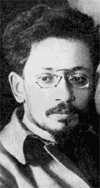Sv
Sverdlov, Yakov Mikhaylovich (1885-1919)
 Chairman of the Central Executive Committee of the Congress of Soviets and secretary of the Central Committee of the Bolshevik Party in 1919. Author of the Soviet Constitution. First president of the Russian Soviet Republic. Sverdlov died of typhus on March 16, 1919.
Chairman of the Central Executive Committee of the Congress of Soviets and secretary of the Central Committee of the Bolshevik Party in 1919. Author of the Soviet Constitution. First president of the Russian Soviet Republic. Sverdlov died of typhus on March 16, 1919.
Born in Nizhny Novogrod on May 22, 1885, Sverdlov was the son of a Jewish engraver. By the age of 17, Sverdlov joined the R.S.D.L.P., joining the Bolshevik Party after the split in the following year. Working out of the Urals (primarily in the city of Yekaterinburg), Sverdlov was a leading organiser of the Bolshevik party; arrested several times, sent to prison and Siberian exile. Lunacharsky wrote:
"I knew that he was a tireless fighter for social democracy, for Bolshevism, knew that he was constantly being sent to prison and into exile, whence he always escaped: whenever they caught him and put him behind bars he would escape again. At once, no matter where fate might take him, he would start organizing Bolshevik committees or cells."
By 1912, Sverdlov was elected into the Central Committee of the party. Released from exile in 1917 by the general amnesty granted by the Provisional Government, Sverdlov returned to Petrograd and became the Secretary of the party. Among all party members, Svedlov's organisational capabilities were outstanding, and his mind remarkable; Lunacharsky wrote: "His memory contained something like a biographical dictionary of communism."
Sverdlov played a major role in organising and planning the October Revolution of 1917. Sverdlov was elected chairman of the CEC, replacing Kamenev in January 1918. By 1918, Sverdlov wrote the Constitution of the R.S.F.S.R.. A year later, catching a cold after giving a speech, Sverdlov continued to work, refusing to stop for sickness. The sickness, however, did not subside; in 1919 Sverdlov died of typhus. By 1924, the city of Yekaterinburg, where Sverdlov had accomplished so much work in, was renamed Sverdlovsk in his honor.
"When he managed to eat and sleep I do not know. He was on duty night and day. Whereas Lenin and a few others provided the intellectual guidance for the revolution, between them and the masses – the Party, the Soviet government apparatus and ultimately all Russia – like a spindle on which it all revolved, like a wire transmitting it all, stood Sverdlov."
Revolutionary Silhouettes: Sverdlov
by Anatoly Lunacharsky